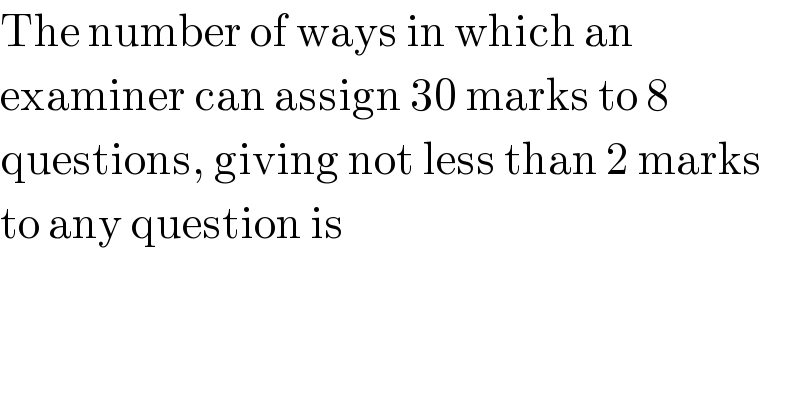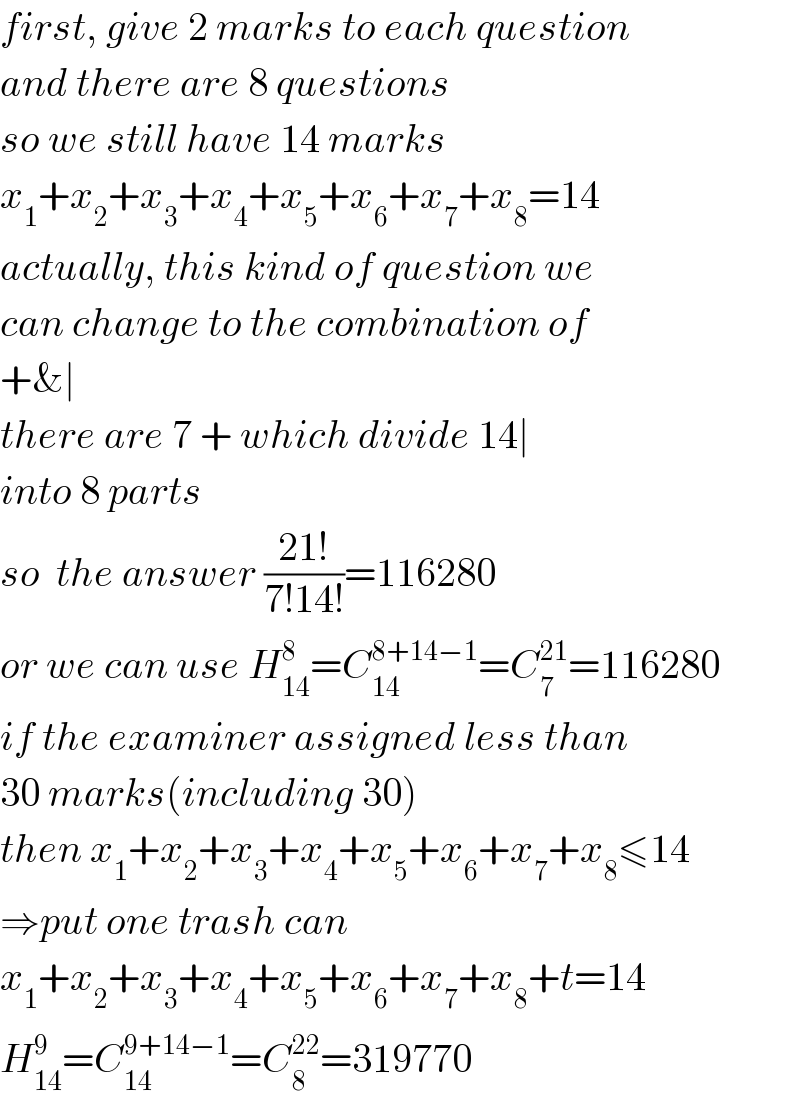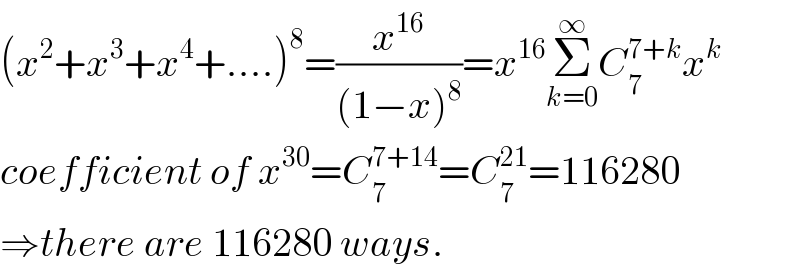Question Number 81724 by zainal tanjung last updated on 14/Feb/20

$$\mathrm{The}\:\mathrm{number}\:\mathrm{of}\:\mathrm{ways}\:\mathrm{in}\:\mathrm{which}\:\mathrm{an} \\ $$$$\mathrm{examiner}\:\mathrm{can}\:\mathrm{assign}\:\mathrm{30}\:\mathrm{marks}\:\mathrm{to}\:\mathrm{8} \\ $$$$\mathrm{questions},\:\mathrm{giving}\:\mathrm{not}\:\mathrm{less}\:\mathrm{than}\:\mathrm{2}\:\mathrm{marks} \\ $$$$\mathrm{to}\:\mathrm{any}\:\mathrm{question}\:\mathrm{is} \\ $$
Commented by Tony Lin last updated on 15/Feb/20

$${first},\:{give}\:\mathrm{2}\:{marks}\:{to}\:{each}\:{question} \\ $$$${and}\:{there}\:{are}\:\mathrm{8}\:{questions} \\ $$$${so}\:{we}\:{still}\:{have}\:\mathrm{14}\:{marks} \\ $$$${x}_{\mathrm{1}} +{x}_{\mathrm{2}} +{x}_{\mathrm{3}} +{x}_{\mathrm{4}} +{x}_{\mathrm{5}} +{x}_{\mathrm{6}} +{x}_{\mathrm{7}} +{x}_{\mathrm{8}} =\mathrm{14} \\ $$$${actually},\:{this}\:{kind}\:{of}\:{question}\:{we} \\ $$$${can}\:{change}\:{to}\:{the}\:{combination}\:{of} \\ $$$$+\&\mid \\ $$$${there}\:{are}\:\mathrm{7}\:+\:{which}\:{divide}\:\mathrm{14}\mid \\ $$$${into}\:\mathrm{8}\:{parts} \\ $$$${so}\:\:{the}\:{answer}\:\frac{\mathrm{21}!}{\mathrm{7}!\mathrm{14}!}=\mathrm{116280} \\ $$$${or}\:{we}\:{can}\:{use}\:{H}_{\mathrm{14}} ^{\mathrm{8}} ={C}_{\mathrm{14}} ^{\mathrm{8}+\mathrm{14}−\mathrm{1}} ={C}_{\mathrm{7}} ^{\mathrm{21}} =\mathrm{116280} \\ $$$${if}\:{the}\:{examiner}\:{assigned}\:{less}\:{than} \\ $$$$\mathrm{30}\:{marks}\left({including}\:\mathrm{30}\right) \\ $$$${then}\:{x}_{\mathrm{1}} +{x}_{\mathrm{2}} +{x}_{\mathrm{3}} +{x}_{\mathrm{4}} +{x}_{\mathrm{5}} +{x}_{\mathrm{6}} +{x}_{\mathrm{7}} +{x}_{\mathrm{8}} \leqslant\mathrm{14} \\ $$$$\Rightarrow{put}\:{one}\:{trash}\:{can} \\ $$$${x}_{\mathrm{1}} +{x}_{\mathrm{2}} +{x}_{\mathrm{3}} +{x}_{\mathrm{4}} +{x}_{\mathrm{5}} +{x}_{\mathrm{6}} +{x}_{\mathrm{7}} +{x}_{\mathrm{8}} +{t}=\mathrm{14} \\ $$$${H}_{\mathrm{14}} ^{\mathrm{9}} ={C}_{\mathrm{14}} ^{\mathrm{9}+\mathrm{14}−\mathrm{1}} ={C}_{\mathrm{8}} ^{\mathrm{22}} =\mathrm{319770} \\ $$
Commented by mr W last updated on 15/Feb/20

$$\left({x}^{\mathrm{2}} +{x}^{\mathrm{3}} +{x}^{\mathrm{4}} +….\right)^{\mathrm{8}} =\frac{{x}^{\mathrm{16}} }{\left(\mathrm{1}−{x}\right)^{\mathrm{8}} }={x}^{\mathrm{16}} \underset{{k}=\mathrm{0}} {\overset{\infty} {\sum}}{C}_{\mathrm{7}} ^{\mathrm{7}+{k}} {x}^{{k}} \\ $$$${coefficient}\:{of}\:{x}^{\mathrm{30}} ={C}_{\mathrm{7}} ^{\mathrm{7}+\mathrm{14}} ={C}_{\mathrm{7}} ^{\mathrm{21}} =\mathrm{116280} \\ $$$$\Rightarrow{there}\:{are}\:\mathrm{116280}\:{ways}. \\ $$
